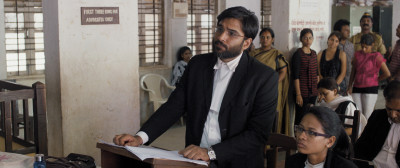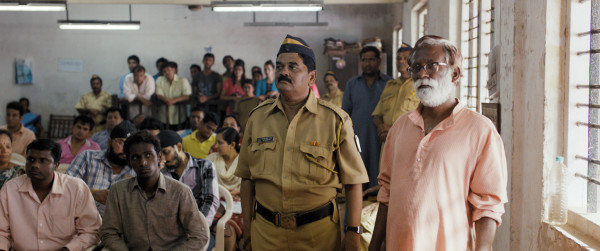INTERVIEW: Director Chaitanya Tamhane enters ‘Court’-room drama

Court, a new drama about India’s legal system, begins its cinematic run today, July 15 at New York City’s Film Forum. The movie is the directorial debut of Chaitanya Tamhane, and what a debut it is. Court has received international acclaim, winning honors at the Venice and Mumbai film festivals.
The film tells the story of Narayan Kamble (Vira Sathidar), an activist and folk singer who is accused of abetting a suicide after a local sewerage worker dies in a manhole. It’s believed, at least by the public prosecutor (Geetanjali Kulkarni), that one of Kamble’s songs inspired the suicide, and thus the activist should be held accountable. The two-hour movie details the entire court case, following the drama from the time of arrest through the many delays in the legal system. Vivek Gomber plays Vinay Vora, Kamble’s lawyer.
The idea for the film came after Tamhane was watching a courtroom drama and didn’t believe the real proceedings were that “well-organized.” So, the filmmaker headed to a lower court in Mumbai. “I was utterly fascinated by what I saw because there was a sense of chaos,” Tamhane said in a recent phone interview. “There was mismanagement, and also the lawyers sometimes were bad orators. And they were making repetitive, redundant arguments at times. … At the same time I felt that these were people I could relate to. Like this judge could be a relative of mine, or this public prosecutor who is not interested in the case, she could be my mother, for example. So I was very fascinated by the setting, and that was my starting point.”
After that experience, he conducted a lot of research and interviewed numerous people. Additionally, he attended a lot of court sessions and scanned through newspaper clippings. This pre-filming stage took one year to complete.

The story in Court is not based on an actual case. “The case itself is entirely fictional, but it is inspired by various trials of left-leaning activists and protest leaders in India,” he said. “So there are, you know, threads and instances, which I have kind of borrowed and been inspired, but from various cases not one particular case.”
Tamhane said the film’s crew needed to build an exact replica of a courtroom in India; this was one of the many challenges of the filming process.
“The thing is in India you are not allowed to shoot in a real courtroom,” he said. “So, of course, it was difficult because we wanted the courtroom to look as realistic as possible, and every other location in the film apart from the courtroom is an actual location in Mumbai. We had to build an entire set, an elaborate set for the courtroom, and the challenge was how to recreate the courtroom in a way that is not a visual jump or a jump in the experience of the viewer.”
The resulting film is one where the entire legal process is on full display. The camera lingers on each scene. After Kamble’s hearing is finished, for example, rather than cutting to the next scene, Tamhane’s lens stays put, taking in the details of the next case on the docket. Similarly, there are many everyday scenes of the public prosecutor, Kamble’s lawyer and even the judge at home, interacting with family and preparing for work and vacation. This storytelling technique and the performances the director was able to elicit from the actors, most of whom are nonprofessional, have placed Court in high acclaim on the international stage.
“We never expected this in our wildest dreams,” the writer-director said of the film’s success. “In fact, when we finished the film, editing the film, we were quite sure that an international audience is not going to understand this film at all because it is set in such a specific cultural milieu. … It is very rooted in India and in Mumbai, so we really had our doubts about how the film will play with a foreign audience. But we are very surprised, and we feel very fortunate and lucky that the film has done so well.”
Tamhane said the reaction in India has been similarly positive, and he’s excited to see how New Yorkers react. This expansive project has taught the novice filmmaker a lot about the process. “Now that I’m a bit more familiar with the medium, and I’ve been through the process once, and because of the kind of acceptance the film has got, I think I’ve become a little more confident,” he said. “And it’s also reassuring to know that I can take more risks and be true to what I want to do.”
By John Soltes / Publisher / John@HollywoodSoapbox.com
- Court is currently playing at New York City’s Film Forum. Click here for more information.

